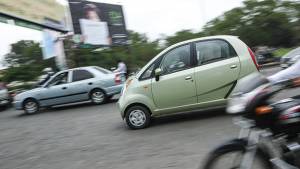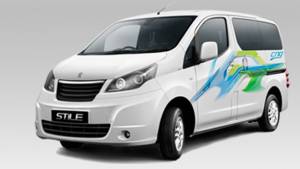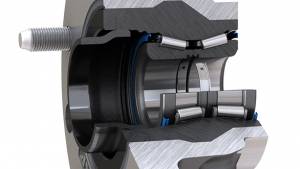How the 2015 Union Budget affects the auto sector
The 2015 Union Budget tabled by the Union Finance Minister, Arun Jaitley did not bring the kind of reforms the auto sector expected. There are, however, a few divisions that got a boost though I believe it's largely the commercial vehicle segment that would be pleased with the changes.
With the boost to infrastructure development, especially roads and highways, the addition of 1 lakh kilometres of roads to the existing 1 lakh that is presently under construction, expect a growth in demand for commercial vehicles.
The increase in custom duties from 10 to 40 per cent for commercial vehicles shouldn't be seen as a deterrent to international players since the segment this applies to is exceedingly small. Anders Grundströmer, managing director, Scania India said, "While the increase in customs duty for commercial vehicles is disappointing, overall the positives outweigh the negatives. The clear commitment to implement GST by April 1, 2016 which is a game changer, easing of norms to aid flow of technology, flow of capital, and focus on sustainable development along with a road map of clearly stated goals in terms of 1 lakh kilometres of roads, doubling the clean energy cess on use of coal and launch of a scheme for faster adoption are all measures in the right direction."
The FM also waived off duty on electric vehicles and hybrids in addition to allocating Rs 75 crore for electric vehicles. I personally don't understand this as there is no one in the country to gain from the duty cuts unless and until there is infrastructure put in place. Presently Mahindra Reva is the only manufacturer with an electric car portfolio and then there are the electric scooters (a highly unorganised sector) imported from China. In either case, without a proper electrification plan, sales and interest aren't going to increase in the domestic market.
Hybrids, however, may have a better day. We are still waiting to see just how this affects pricing of hybrids though presently there are just two hybrid cars sold in India. Toyota sells the Prius, Camry hybrid and recently BMW launched the i8 (priced at over Rs 2.3 crore). Vikram S Kirloskar, vice chairman, Toyota Kirloskar Motor Pvt Ltd and president of Society of Indian Automobile Manufacturers (SIAM) was complimentary of the budget saying, "We compliment the Finance Minister for announcing the pro-India budget that would strengthen the social fabric, improve governance and tax rationalisation. Overall, a positive budget for both corporates and individuals."
With the tax breaks, expect some money to flow into the hands of individuals which may encourage small entry level car sales. Same may apply to the rural sector where the affluence of these customers thanks to the rural programmes is set to grow. This, however, is clutching at straws and there may not be any actual growth as prices of cars are not set to drop. Also, any shift in growth patterns will only be visible late in 2015, if not 2016.
The government is keen to extend the Make in India policy to the defence sector as well. With the increase in defence expenditure and the push to indigenise defence supplies I see manufacturers like Tata Motors, Mahindra and Ashok Leyland taking on a more active role. Each of these manufacturers has made significant investments into the defence sector and I see that growing.
Overall then, the budget hasn't been optimistic for the auto sector and 2015, I now expect, will continue to be a challenging year ahead. Joe King, head, Audi India had this to say, "It is no doubt a visionary budget with focus on long-term growth of the country. We welcome the move towards the rollout of GST next year. We are happy to see the emphasis placed on boosting infrastructure. This will go a long way in fulfilling the government's vision to make India the fastest growing large economy in the world. We welcome the reduction of Corporate Tax as well as focus on infrastructure via various schemes and investments. However, we expected more of a direct support to the auto industry which has been contributing, significantly to the GDP."
Even Arvind Saxena, president and managing director of General Motors India expressed mixed feelings over the budget saying, "As far as the automotive industry is concerned, we were expecting excise duty cut on all categories of vehicles as the auto industry continues to bleed due to high interest rates, economic slowdown etc. There are some changes in CST and also on customs duty which need to be clarified from the fine print. Having said this, the focus on rural roads, highways, expressways, incentives for electric vehicles are welcome decisions. Some of the other announcements made by the finance minister on the direct taxation front are also positive steps. Overall, the budget lays down a blue print for a stable tax regime that can lead to growth in the economy."
Hopefully things will look up in the future but as of now, the automotive industry will continue to bleed for some time to come.
Related Stories
Top Stories
Latest Videos
Most Popular
- Budget Sportbike Showdown: Kawasaki Ninja 500 vs Aprilia RS 457 vs Yamaha YZF-R3
- 2014 Triumph Daytona 675 vs 2024 Kawasaki ZX6R - A Decade of Evolution in Supersport Motorcycles
- Mumbai-Pune Expressway speed restrictions updated
- Nissan Magnite EZ-Shift review - is the AMT any good?
- Nitin Gadkari states that tax on Hybrids should be reduced to 12 percent in the coming future














